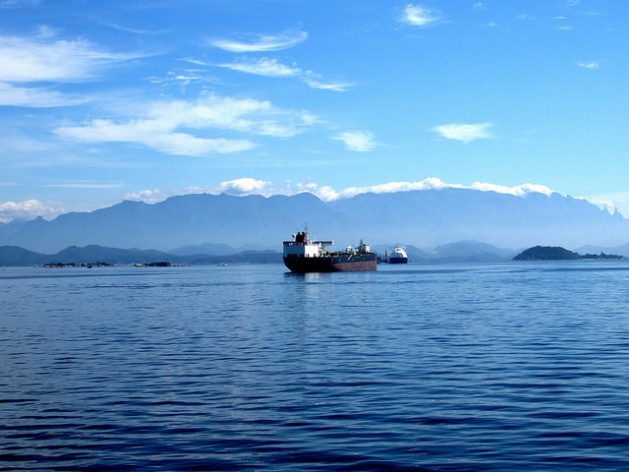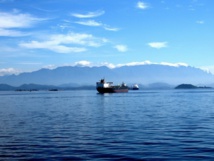Rio De Janeiro – 04 May 2015 – Fabiola Ortiz informs that according to IPS reports Brazil has begun to see the Atlantic Ocean as its “last frontier to the east”. Meanwhile, the exploitation of the said ocean through oil extractions and other forms natural resources’ removal is continue, whereas the conservation and research related work are “lagging” comparatively. Consequently, the entire extent of the biodiversity of the Atlantic still remains unknown.
Interestingly, the authorities of Brazil have assigned the name “The Blue Amazon” to the Atlantic Oceans due to its hidden riches in “energy resources” and in biodiversity. Moreover, the term also refers to the said territory in the new treaties on international maritime law. In fact, the rich marine area of the Atlantic equates to the extension of Brazil’s rainforest whereby it occupies “half the size of the national territory”.
The said country is facing “challenge(s)” in attempting to save the marine wealth “along 8,500 km of shoreline”. Furthermore, as per IPS, the Brazilian continental “shelf” reserves 90% of oil and 77% of natural gas reserves of the country. The director of “the Strategic Studies Institute” from “Fluminense Federal University”, Eurico de Lima Figueiredo informs:
Interestingly, the authorities of Brazil have assigned the name “The Blue Amazon” to the Atlantic Oceans due to its hidden riches in “energy resources” and in biodiversity. Moreover, the term also refers to the said territory in the new treaties on international maritime law. In fact, the rich marine area of the Atlantic equates to the extension of Brazil’s rainforest whereby it occupies “half the size of the national territory”.
The said country is facing “challenge(s)” in attempting to save the marine wealth “along 8,500 km of shoreline”. Furthermore, as per IPS, the Brazilian continental “shelf” reserves 90% of oil and 77% of natural gas reserves of the country. The director of “the Strategic Studies Institute” from “Fluminense Federal University”, Eurico de Lima Figueiredo informs:
“We haven’t fully grasped just how immense that territory is. To give you an idea, the Blue Amazon is comparable in size to India... But we aren’t prepared to take care of it; it isn’t yet considered a political and economic priority for the country.”
Brazil is enlisted among the ten countries that hold “the largest continental shelves”. Moreover, the hidden “untold natural wealth” of the Atlantics “offers enormous economic, scientific and technological potential” to Brazil. Moreover, Brazil’s claim for additional “expansion of the continental shelf”, which has, so far, been partially recognised by “The U.N. Convention’s Commission” granting the country the power to exploit the resources, has annoyed “some neighbour countries”.
According to Figueiredo, the present test lies in protecting and monitoring the “continental shelf”, he says:
“We don’t have full sovereignty with regard to the maritime territory. Brazilian society is unaware of the important need to protect the Blue Amazon. There are enormous shortcomings, with respect to our needs.”
There were plans of upgrading the Brazilian navy for security purposes which would include various dimensions like “military, economic, technical and scientific”. However, the scientific researches in the country are “outpaced” by exploitation of natural resources such oil that lies covered “7,000 metres below the ocean surface, beneath a thick layer of salt, sand and rocks”.
In the opinion of the oceanographer, David Zee, Brazil is yet to catch up a lot on the “international community” commitment front whereby he states:
“We have duties – we have to meet the U.N.’s scientific research requirements. We have to take greater care of our marine resources”.
Furthermore, the Brazilian coastline boarders “the Mata Atlántica ecosystem” which represents “the ecological transition” taking place “between land and marine ecosystems” through the roots of mangroves, movements of sand dunes, facades of cliff, bays, beaches along tidal flow in the estuary, and the rich ecology of the coral reefs, wherein the warm currents of the South mingling with that of the Northeast create a favourable condition for marine life to flourish, sheltered within the flora of the coral reefs.
Nevertheless, IPS reports that only 1.5% of the Brazilian “maritime territory” receives “legal protection”. Consequently, the ocean water still remains “enormous political and military challenge”. Moreover, certain officers argue that “extraction of marine resources” should take into account the preservation of marine biodiversity. In Figueiredo’s view:
“Our ability to defend the Blue Amazon depends on our capacity to develop technical-scientific means of protecting biodiversity in such an extensive area”.



















